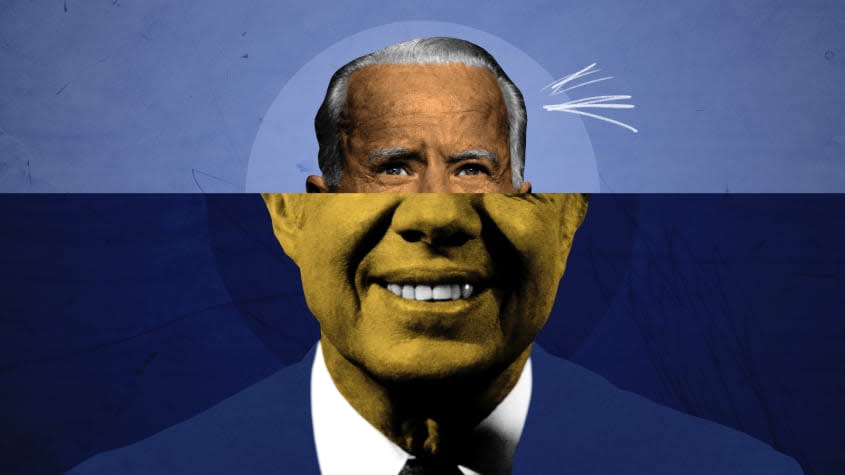Republicans really, really want Biden to be the new Jimmy Carter

- Oops!Something went wrong.Please try again later.
- Oops!Something went wrong.Please try again later.
The victory of the Taliban in Afghanistan, along with the sometimes-chaotic withdrawal of American forces from that country, has produced a gusher of conservative commentary comparing President Joe Biden to his 1970s Democratic predecessor, Jimmy Carter. "This is Joe Biden's Jimmy Carter Moment" the New York Post declared. "He is like Jimmy Carter on acid," Meghan McCain, the former TV host, announced on Twitter. The conservative Washington Examiner had two different columnists connect the legacies of Biden and Carter in recent weeks, but that was restrained compared to the Wall Street Journal, where opinion pieces identifying Biden-Carter similarities have become almost routine.
Needless to say, Fox News has also jumped on the Biden-Carter bandwagon.
"Jimmy Carter only had a year of a hostage crisis," host Jesse Watters declared last week. "Joe Biden's going to have three years of a hostage crisis. I don't see how he survives this."
The message: Carter was a failed one-term Democratic president, undone to a considerable extent by the Iran hostage crisis, and now Biden — thanks to Afghanistan — is on track to duplicate Carter's fate. Conservative pundits, it appears, are trying to generate a miasma of failure around the current president.
Are they right? Probably not.
As Watters himself pointed out, the political timing for the two presidents is dissimilar. Carter faced the Iran crisis at the tail end of his first and only term in office, while Biden is still serving the first year of his presidency. Timing matters — a lot can happen in three years that might make the current situation a distant memory by the time 2024 comes around. The substantive differences are important, as well: Despite what Watters and other Fox hosts have asserted, the Taliban don't seem much interested in holding American hostages. They have, after all, expressed interest in maintaining diplomatic relations with the United States even after American troops have withdrawn from the country. No doubt those relations would be fraught after 20 years of war, and all bets are off if Afghanistan's instability leads to a terrorist attack on U.S. soil sometime soon. I think that's unlikely. Instead, as my colleague Noah Millman has written, there is a chance the Taliban could end up as American allies in the not-too-distant future. Even if that doesn't happen, it's far from a sure thing that voters will have an "Afghanistan crisis" on their minds by the time next year's midterm elections are held.
Besides, the most obvious and perhaps over-used point of comparison for Biden is clearly the fall of Saigon — the collapse of a U.S.-allied government after decades of vicious civil war. That defeat happened under a Republican president, though, as did the withdrawal of American troops from Vietnam that preceded it. Right-leaning commentators aren't spending much time comparing Biden to Gerald Ford or Richard Nixon these days, however.
Which means the Biden-Carter comparisons aren't really strictly considered analyses — instead, they're mostly a bit of wish-casting by the right-wing pundits. In conservative mythology, the paradise of Ronald Reagan's "Morning in America" presidency was preceded by the darkness of the Carter years, a time of high inflation, humiliation abroad, and low morale at home. Republicans are clearly rooting for history to repeat itself. If that doesn't work, perhaps ritually using Carter's name over and over again — like saying the name "Beetlejuice" three times in a row — will conjure a new GOP ascendancy.
Indeed, conservative writers and politicians were already invoking Carter while commenting on the Biden presidency long before Kabul fell to the Taliban. Sen. Ted Cruz (R-Texas) called Biden "Jimmy Carter 2.0" at the beginning of July. Donald Trump offered a similar comment in May, as did Liz Peek at Fox News and former Trump official Robert Wilkie at The National Interest. Trump's comment prompted U.S. News & World Report to observe that "GOP lawmakers and 2024 presidential wannabes are hoping that tying Biden to Carter will prove a winning gambit." This isn't a new trick. During Barack Obama's presidency, a number of conservative writers all tried and failed to persuade the public that the younger president was "the new Jimmy Carter." Whenever conservatives look at a Democratic president, it seems all they see is a peanut farmer.
The irony is that Carter's reputation has probably never been better. He has long been considered one of the best ex-presidents, thanks to his post-White House activism both at home and internationally. His presidency is getting a fresh look, too, with some historians saying Carter deserves credit for his efforts at Middle East peace, arms control, and domestic deregulation. It's not clear, though, how much this legacy — good or bad — is salient to current voters: Most Americans living today weren't even born when Carter left the White House in January 1981.
Maybe conservatives can make the charge stick this time. Perhaps some mix of circumstances — continued high inflation, unsettled labor markets, and international crises — will drag down Biden, and with him his party's chances of keeping the White House in 2024. Or perhaps they won't. Either way, Biden surely won't be the last Democratic president that Republicans try to stick with the "Jimmy Carter" brand.
You may also like
Actor suspected of participating in Capitol attack arrested in California
Pelosi admonishes congressmen who flew to Kabul amid evacuation efforts
CIA director reportedly holds secret meeting with Taliban leader Abdul Ghani Baradar

